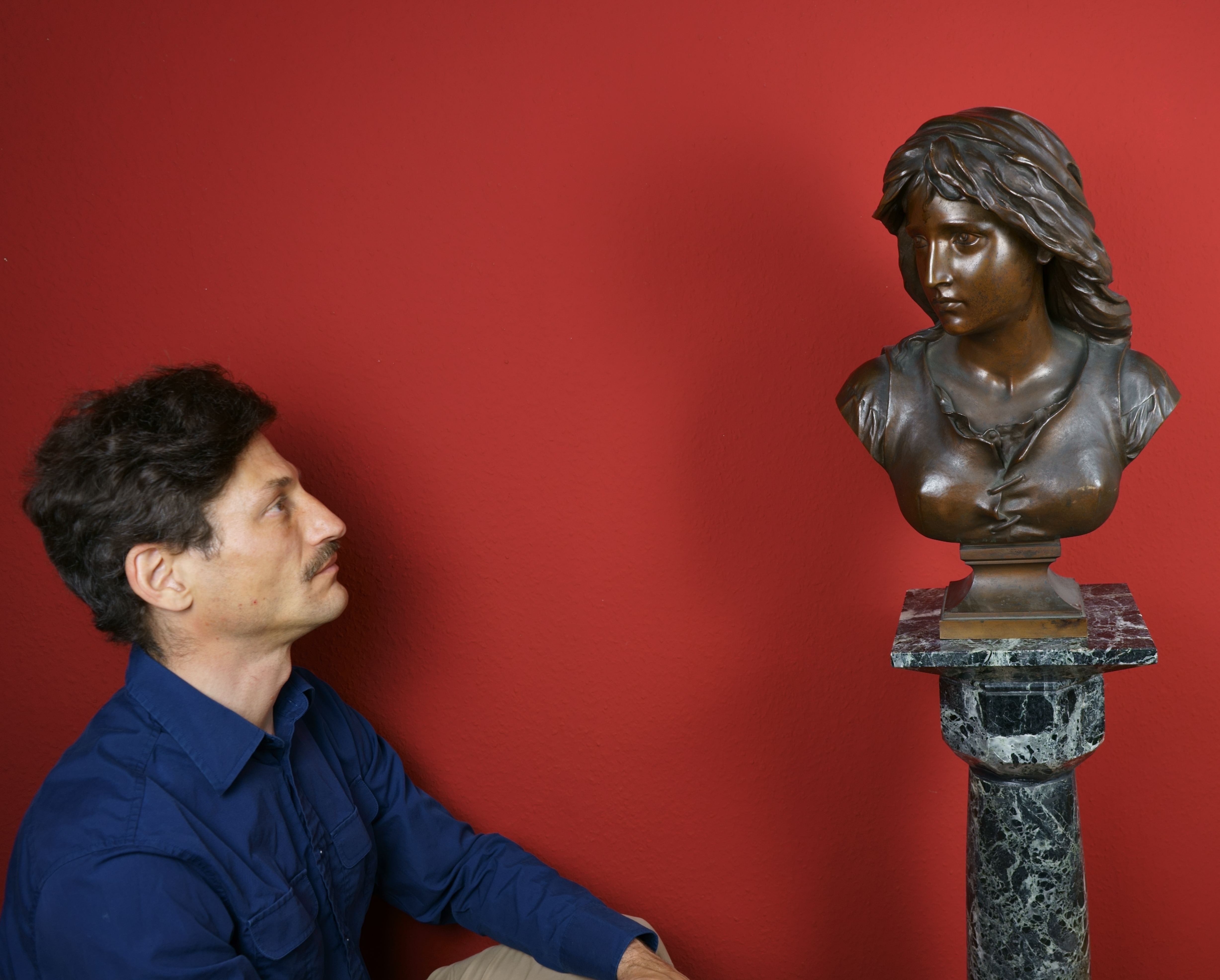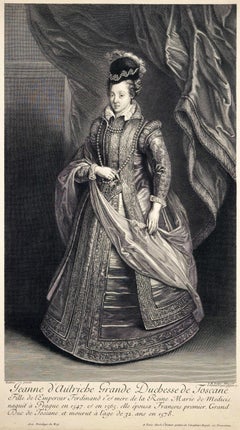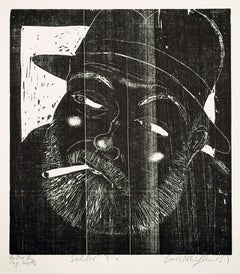Want more images or videos?
Request additional images or videos from the seller
1 of 4
Emil OrlikGerhart Hauptmann / - Modern Classicism -1922
1922
$449.72List Price
About the Item
- Creator:Emil Orlik (1870 - 1932, Czech)
- Creation Year:1922
- Dimensions:Height: 11.82 in (30 cm)Width: 9.06 in (23 cm)Depth: 0.4 in (1 cm)
- Medium:
- Movement & Style:
- Period:
- Condition:
- Gallery Location:Berlin, DE
- Reference Number:1stDibs: LU2438216308502

About the Seller
5.0
Vetted Professional Seller
Every seller passes strict standards for authenticity and reliability
Established in 2014
1stDibs seller since 2023
22 sales on 1stDibs
Authenticity Guarantee
In the unlikely event there’s an issue with an item’s authenticity, contact us within 1 year for a full refund. DetailsMoney-Back Guarantee
If your item is not as described, is damaged in transit, or does not arrive, contact us within 7 days for a full refund. Details24-Hour Cancellation
You have a 24-hour grace period in which to reconsider your purchase, with no questions asked.Vetted Professional Sellers
Our world-class sellers must adhere to strict standards for service and quality, maintaining the integrity of our listings.Price-Match Guarantee
If you find that a seller listed the same item for a lower price elsewhere, we’ll match it.Trusted Global Delivery
Our best-in-class carrier network provides specialized shipping options worldwide, including custom delivery.You May Also Like
Lonely dreamers .1992. Paper, etching, watercolor, 22x14 cm
Located in Riga, LV
Lonely dreamers
1992. Paper, etching, watercolor, 22x14 cm.
Roman Lapp (1961. 24. VII Moscow) – painter
Artist learned drawing to M. Zuhovickis.
He graduated Art Academy of Latvia,...
Category
1990s Impressionist Figurative Prints
Materials
Paper, Watercolor, Etching
$454 Sale Price
20% Off
H 8.67 in W 5.52 in D 0.4 in
Portrait of the Print Connoisseur Johan Philip van der Kellen Netherlands
Located in Soquel, CA
Jan Pieter Veth (1864 - 1925) was a Dutch portrait painter and academic. During the first two decades of the twentieth century, Veth was one of the most popular portrait painters in...
Category
1860s Impressionist Figurative Prints
Materials
Laid Paper, Engraving
Jan Pieter VethPortrait of the Print Connoisseur Johan Philip van der Kellen Netherlands, Circa 1865
$550
H 17 in W 14 in D 0.5 in
"Eternal Problem" - 1924 Etching on Paper
Located in Soquel, CA
"Eternal Problem" - 1924 Etching on Paper
Etching on paper titled "Eternal Problem" by Elias M. Grossman (American, 1898-1947). A bearded rabbi is portrayed thinking with his hand p...
Category
1920s American Impressionist Figurative Prints
Materials
Paper, Ink, Etching
$520 Sale Price
20% Off
H 16 in W 19 in D 1 in
"Study 8" Figurative Lithograph
By Jim Smyth
Located in Soquel, CA
Lithograph of a figure of a woman by Jim Smyth (American, b. 1938). Numbered, titled, signed and dated "3/12", "Study 8", "Smyth 74” along the bottom edge. Unframed.
Jim Smyth has studied at the Academia de Belle Arti in Fiorenza, Italy, Ecole des BeauxArts in Geneva, New York Academy, and the Art Students League. He is also a graduate of UC Berkeley with a degree in Fine Art.
Although academically trained, Smyth practices and teaches a more impressionistic style of painting, focusing on the Alla Prima technique.
He is particularly knowledgeable about drawing, perspective, color theory and the human figure, his passion. Smyth, with extensive academic knowledge, has a profound love of all human representations as illustrated by his humorous quick sketches from life. He also practices and teaches oil painting and pastels.
When not in Provence, or Southeastern France, Smyth teaches intensely in art schools, art centers and several colleges in the Bay Area. He is a beloved instructor and his classes fill in quickly as he is very knowledgeable.
On his return to the United States, he began studying with Mr. Alanson Appleton at the College of San Mateo, San Mateo, California. Smyth was a founding member of the Appletree Etchers, Inc., an etching print shop organized by Mr. Appleton and his students to develop and promote color intaglio. Smyth served as Master Printer at the studio for many years perfecting the techniques of intaglio and developing the color theories of Mr. Appleton as applied to the deeply etched plate.
Smyth received his degree from the University of California, Berkeley, in 1972 and holds the California Community College Certificate and an Adult Education Certificate. Smyth was invited to teach "Anatomy for Artists" at Foothill College, Los Altos Hills, California, as a result of his many years of dissection of the cadaver and developed the course of study of Perspective for the college. During this period, he began teaching Life Drawing at the Pacific Art League of Palo Alto, Palo Alto, California. During the following thirty years Smyth has taught an average of twelve classes per week at the Pacific Art League of Palo Alto, the Palo Alto Art Center and the Burlingame Recreation Department among others in all phases of drawing and painting. He has conducted many workshops for the California Academy of Painters in many aspects of drawing and painting. Currently, he is an Adjunct Professor of Drawing at the College of San Mateo, San Mateo, California. He is an authority on the materials of painting and drawing, techniques of traditional drawing and painting, color theory, perspective and anatomy for artists. In his career in Life Drawing, Smyth has made over two hundred thousand drawings from the model.
In addition to studies at Berkeley, Smyth has studied at the College of San Mateo, Foothill College, De Anza College, Mission College, and West Valley College, all in California. One of the pivotal points in his career was studying with Mr. Maynard Dixon Stewart at the University of San Jose, California. He spent a year at the New York Academy of Art where he was offered a full scholarship and at the Art Students League of New York. He concurrently attended classes at the National Academy of Design in New York. Among others, Smyth studied with M. Andrejivec, Ted Schmidt, Elliot Goldfinger, Gary Fagin, Ted Jacobs, Leo Neufeld, David Leffel, Jack Ferragasso, Jim Childs and Everett Raymond Kinstler and Kim English. Smyth has also studied with the noted painter and colorist, Ovanes Berberian...
Category
1970s American Impressionist Figurative Prints
Materials
Paper, Etching
Female Figure Underwater Realist Etching --"Separation" by Carol Bennett
By Carol Bennett
Located in Soquel, CA
Female Figure Underwater Realist Etching --"Separation" by Carol Bennett
Unique etching of a female figure submersed beneath the surface of water by California and Hawaii artist Ca...
Category
1990s American Impressionist Figurative Prints
Materials
Etching, Laid Paper
$972 Sale Price
20% Off
H 19 in W 24 in D 1 in
Early 20th Century Miniature Etching, Portrait of an Old Woman by Ralph Sweet
Located in Soquel, CA
Early 20th Century Miniature Etching, Portrait of an Old Woman by Ralph Sweet
Compelling early 20th century small-scale figurative etching of an old...
Category
Early 20th Century American Impressionist Portrait Prints
Materials
Paper, Etching
$875
H 7.25 in W 5.5 in D 0.25 in
Young Girl by the Window, Mid-century Portrait
By Ben Messick
Located in Soquel, CA
Mid-century portrait of a young girl by a window by acclaimed California artist Ben Messick (American, 1891-1981). Signed "Ben Messick" in plate, and in pencil in the lower right corner, by the estate. Presented in an off-white mat. Unframed. Paper size: 12"H x 12"W
The following is submitted by Jim Lafferty whose sources include the autobiography of the artist:
William Washington Messick married Sarah A. Bristow January 2,1889 and from this marriage a son, Benjamin Newton Messick was born on January 9, 1891 on a farm near Strafford, Missouri. His art talent was apparent from the time he was a child and later recognized by his commanding officer in World War I. He completed his training in Los Angeles at Chouinard in the late-1920s and is well-known for his Regionalist scenes and Modernist paintings. He was an instructor at Chouinard through the 1950s & influenced a generation of LA Modernists.
Little is recorded in his autobiography about Messick's life from his teen years and service during the War. He enrolled at Chouinard Institute in the Fall of 1925, and was given a three-year scholarship by Mrs. Chouinard. In 1925 he won a cash award at the Los Angeles County Fair for a group of pen and charcoal drawings done in the parks and streets of Los Angeles. These works give the appearance of being spontaneous and fluid.
In 1930 Messick left Chouinard as a full-time student and rented an apartment on West Eighth Street to use as a studio and living quarters. He had his own ideas on what he was trying to accomplish in art. "If you should ask what is the message of my drawings, I should say that they may explain themselves or may be just a technical exercise."
By the mid 1940s, Messick's position in the art world had been well established as a teacher, painter, printmaker, writer and critic. Over his life time he had over 400 shows and exhibitions. Starting in 1939 he produced a number of stone lithographs that appear to the untrained eye as original drawings. To Messick the image was the most important aspect of his lithographs, and his signature in the plate was sufficient. Hand signing each lithograph did not seem necessary to him. He exhibited prints widely including the Albany Print Club and the Metropolitian Museum.
To further substantiate the authenticity of Messick's prints the Eclectic Gallery under the authority of the Messick family posthumously pencil signed each estate-acquired stone lithograph.
Messick had a childhood fascination with the circus and started drawing and painting the circus in 1935. His circus work, especially his clown studies, and his lithographs became his trademark work for in the 1940s and 1950s. A critic for ART REVIEW described his Big Top work this way: "His circus canvases...
Category
1940s American Impressionist Figurative Prints
Materials
Paper, Ink
Portrait d’Homme Barbu Alphonse Hirsch - Etching by G. De Nittis -1875
By Giuseppe De Nittis
Located in Roma, IT
Important and rare etching by G. De Nittis. Good condition with fine tonal contrasts. Slight foxing all over the sheet
1st state - before the ink veiling. "This drypoint in one of ...
Category
1870s Impressionist Figurative Prints
Materials
Etching, Paper
$14,793
H 8.86 in W 7.09 in D 0.04 in
THE CRITIC
By Norman Rockwell
Located in Aventura, FL
Collotype in colors on paper. Unsigned. Title and copyright info in typeset lower margin.
Artwork is in excellent condition. All reasonable offers will be considered.
Category
1970s American Impressionist Portrait Prints
Materials
Paper
CHEERING
By Norman Rockwell
Located in Aventura, FL
Hand signed and numbered by the artist. From School Days portfolio. Artwork size 26 x 20 inches. Frame size approx 30 x 26 inches. Edition of 200.
Artwork is in excellent condi...
Category
1970s American Impressionist Portrait Prints
Materials
Paper, Lithograph
More From This Seller
View AllJohn F. K.'s Nightmare / - Congealed into an icon -
By Pure Evil
Located in Berlin, DE
Charles Uzzell-Edwards aka 'Pure Evil' (*1968), John F. K.'s Nightmare, c. 2010. Color serigraph, 35.4 x 25 cm, signed in pencil lower right with artist's name and artist's signet, i...
Category
2010s Pop Art Figurative Prints
Materials
Paper
Marlene Dali / - Icon and Irony -
By Pure Evil
Located in Berlin, DE
Charles Uzzell-Edwards aka ‘Pure Evil’ (*1968), Marlene Dali, around 2010. Color silkscreen, 35.9 x 24.5 cm, signed in pencil lower right with artist's name and artist's signet, iden...
Category
2010s Pop Art Figurative Prints
Materials
Paper
Joan of Austria / - The luminosity of the print -
By Gerard Edelinck
Located in Berlin, DE
Gérard Edelinck (1640 Antwerp - 1707 Paris), Joan of Austria, 1707. Copperplate engraving, 51.2 cm x 29.8 cm, inscribed below the image: "Jeanne d'Autriche Grande Duchesse de Toscane...
Category
Early 1700s Realist Portrait Prints
Materials
Paper
Self / - Inversion -
Located in Berlin, DE
Kurt Mühlenhaupt (1921 Klein Ziescht - 2006 Berlin), Myself, c. 1975. Woodcut, 32 cm x 29 cm (image), 36.5 cm x 32.5 cm (sheet size), signed in pencil lower right and titled “Selbst....
Category
1970s Realist Figurative Prints
Materials
Paper
The Dirndl Model / - The strangeness of the homeland -
By Reiner Schwarz
Located in Berlin, DE
Reiner Schwarz (*1940 Hirschberg), The Dirndl Model, 1969. Lithograph, 33 cm x 26 (depiction), 59 cm x 42 cm (sheet size), signed “R.[einer] Schwarz” in pencil lower right, dated “[1...
Category
1960s Surrealist Figurative Prints
Materials
Paper
$236 Sale Price
20% Off
The Hut / - The head of the hat -
By Reiner Schwarz
Located in Berlin, DE
Reiner Schwarz (*1940 Hirschberg), The Hut, 1967. Lithograph, 32.5 cm x 32.5 (depiction), 59 cm x 42 cm (sheet size), signed “R.[einer] Schwarz” in pencil lower right, dated “[19]67”...
Category
1960s Surrealist Figurative Prints
Materials
Paper
$208 Sale Price
20% Off
Recently Viewed
View AllMore Ways To Browse
Vintage 1960s Fashion Illustration
Vintage Athena Prints
Vintage Braniff Posters
Vintage French Posters Nude
Vulgate Bible
Walter Henry Williams
Wesselmann Foot
Western Airlines Poster
Whistler Original Print
William Greengrass
Winslow Homer Etchings
Zodiac Sign Hebrew
1790 Lithograph
1800s Vintage Dresses
1940s Vintage Pin Up Art
1972 Pontiac
1980s Vintage Museum Poster
Alec Monopoly Signed

